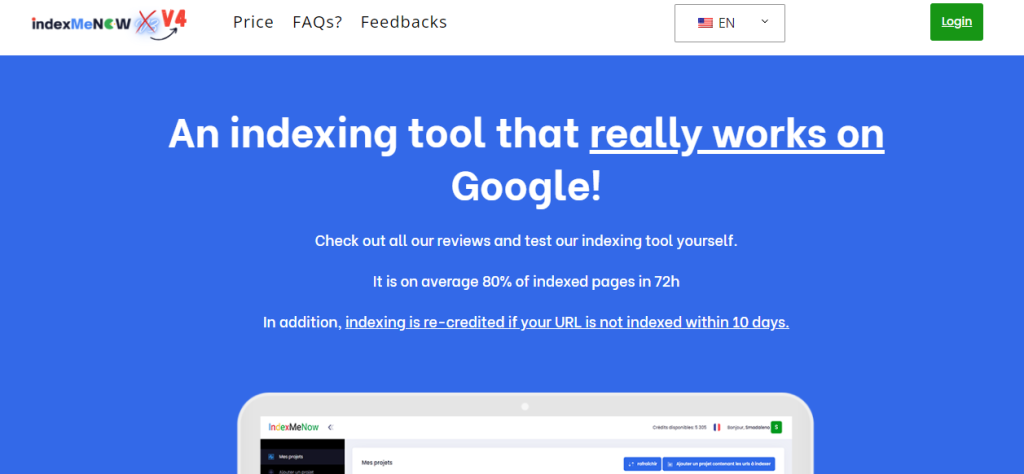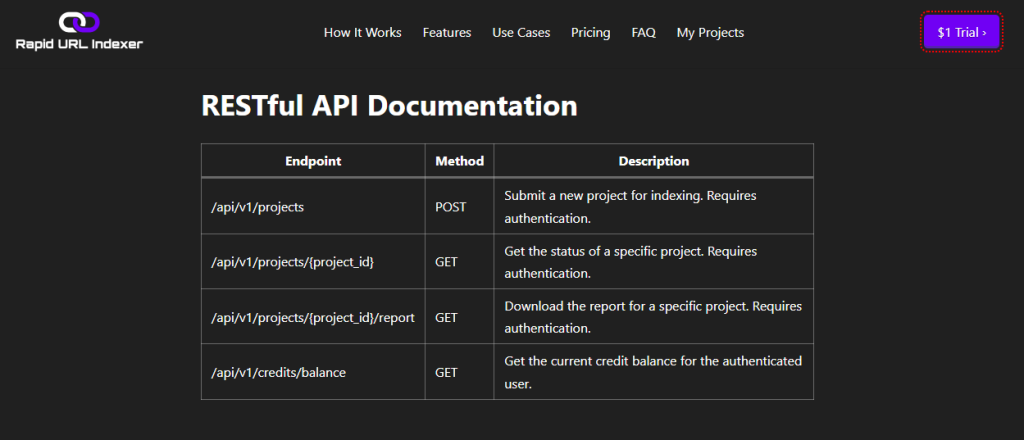Having your website indexed by Google is crucial for online visibility. To achieve this efficiently, it’s essential to use the right indexing tool. In today’s competitive digital landscape, two popular tools are TitleIndexMeNow and Rapid URL Indexer.
For SEO professionals and website owners, Google indexing services are indispensable. This article compares two leading options: IndexMeNow and Rapid URL Indexer. We’ll delve into their features, pricing, indexing methods, and more to help you choose the best service for your needs.
Overview of Both Google Indexing Services
Here’s a detailed comparison of IndexMeNow and Rapid URL Indexer:
What is Rapid URL Indexer?
Rapid URL Indexer is a robust indexing service known for its high success rate and advanced features. It caters to SEO professionals with its user-friendly interface and comprehensive tools. With an average indexing rate of 91%, Rapid URL Indexer follows a pay-as-you-go pricing model and offers a 100% credit auto-refund for unindexed URLs within 14 days.
Additional tools provided by Rapid URL Indexer include a WordPress plugin, RESTful API, visual charts, CSV report downloads, unbranded reports, and an affiliate program. These features make Rapid URL Indexer a versatile choice for various indexing requirements.
What is IndexMeNow?
IndexMeNow is another popular indexing service that helps in quickly getting URLs indexed by Google. It operates on a credit-based system and offers various plugins to streamline the indexing process. With an 80% average indexing rate, IndexMeNow provides refunds for unindexed URLs after 10 days.
Additional tools available with IndexMeNow include a WordPress plugin, Chrome plugin, basic API, project-level statistics, and exportable results. While not as feature-rich as Rapid URL Indexer, IndexMeNow offers a solid set of features for basic indexing needs.

Indexing Methods and Reliability
How do the indexing techniques differ?
Rapid URL Indexer employs multiple safe and effective methods that align with Google’s algorithms, resulting in a 91% success rate. The service adapts to Google’s evolving algorithms by using a combination of techniques for consistent performance.
On the other hand, IndexMeNow relies on three specific indexing techniques, leading to an 80% average success rate. While effective, this limited approach may impact the speed of indexing compared to Rapid URL Indexer.
What are the success rates for each service?
Rapid URL Indexer’s 91% average indexing rate ensures reliable and efficient results, improving search visibility. With most submitted URLs indexed quickly, users can expect enhanced visibility in search results.
IndexMeNow’s 80% average indexing rate breaks down as follows:
- 60% of URLs indexed within 24 hours
- 10% indexed after 24 hours
- 10% indexed after 72 hours
- The remaining 5% indexed up to 10 days later
Although effective, IndexMeNow’s lower success rate and longer indexing times may impact the visibility of new content in search results.
Pricing Models
How does Rapid URL Indexer’s pricing work?
Rapid URL Indexer offers a flexible pay-as-you-go model, where users only pay for successful indexing attempts. This pricing model provides excellent value, particularly for varying indexing needs. The pricing tiers are as follows:
500 Credits cost $25, 1,500 Credits are priced at $68 (9% savings), 5,000 Credits for $213 (15% savings), and 50,000 Credits at $2,000 (20% savings).
What is IndexMeNow’s pricing structure?
IndexMeNow uses a credit-based system with higher costs per credit compared to Rapid URL Indexer. Their packages include:
60 credits for $59, 260 credits for $199, 600 credits for $399, and 2,000 credits for $999. While offering flexibility, these packages tend to be more expensive per credit than Rapid URL Indexer’s packages.
Refund Policies
What is Rapid URL Indexer’s refund policy?
Rapid URL Indexer has a 100% credit auto-refund policy for unindexed URLs within 14 days. This automated policy ensures users pay only for successful indexing, without the need for manual refund claims.
How does IndexMeNow handle refunds?
IndexMeNow offers refunds for unindexed URLs after 10 days, credited back to the user’s account balance. While the process is automated, manual checking and claiming may be required in some cases. This policy, although beneficial, is not as straightforward as Rapid URL Indexer’s automatic refund system.
Types of URLs Indexed
What types of URLs can Rapid URL Indexer handle?
Rapid URL Indexer can index a wide range of URL types, making it suitable for various SEO needs. It can handle regular web pages, product pages, backlinks, press releases, social media profiles, mass page websites, SEO testing pages, and even disavowed links. This broad capability makes it ideal for complex SEO strategies and diverse content types.

What URL types does IndexMeNow support?
IndexMeNow handles pages and articles from owned and non-owned sites, backlinks, and profile pages. While covering the basics, it doesn’t explicitly mention support for mass page websites or SEO testing pages, limiting its usefulness for some advanced SEO strategies.

Reporting and Analytics
What reporting features does Rapid URL Indexer offer?
Rapid URL Indexer provides comprehensive reporting and analytics tools, offering deep insights into indexing efforts. Detailed reports with visual charts make it easy to monitor progress, and CSV file downloads allow for further analysis, especially beneficial for large-scale projects.
Timely and accurate status updates from Rapid URL Indexer enable real-time tracking of the indexing process, valuable for time-sensitive content or SEO impact monitoring.
Unbranded reports from Rapid URL Indexer are perfect for agencies or consultants presenting results to clients. These customizable reports enhance professionalism in client interactions.
How does IndexMeNow handle reporting?
IndexMeNow offers basic analytics tools compared to Rapid URL Indexer. While providing essential information on indexed URLs, the depth of analysis may be limited.
Project-level statistics and hourly indexing checks are available with IndexMeNow, useful for overall performance tracking. IndexMeNow also saves Google HTML backups and preserves meta tags for indexed URLs, aiding in tracking changes and troubleshooting.
Exportable results are available, although the format and detail may not match Rapid URL Indexer’s comprehensive reports.
Additional Features
What extra features set Rapid URL Indexer apart?
Rapid URL Indexer offers a range of additional features to enhance SEO efforts. The robust WordPress plugin seamlessly integrates with WordPress sites for automatic content submission and time-saving indexing.
The RESTful API allows deep integration with other tools, automating indexing workflows for efficiency and scalability. Zapier integration enables connectivity with numerous apps, creating powerful automation workflows.
Detailed visual charts provide actionable insights for optimizing indexing efforts, offering a clear representation of progress and success rates.
What additional tools does IndexMeNow provide?
IndexMeNow offers useful features, including a WordPress plugin for content submission automation and a Chrome plugin for quick URL submissions. While not as extensive as Rapid URL Indexer, these tools cater to basic indexing needs.
However, IndexMeNow lacks advanced API capabilities and integrations that make Rapid URL Indexer versatile.
User-Friendliness
How user-friendly is Rapid URL Indexer?
Rapid URL Indexer prides itself on its user-friendly design, catering to both SEO experts and non-technical users. Clear directions on a well-organized interface guide users through the indexing process, making complex tasks manageable.
Thoughtful design and thorough documentation enhance user experience, especially in activities like analyzing reports or setting up API connectors. The reporting system is user-friendly, with visual charts aiding in data evaluation.
Integration with WordPress further enhances user-friendliness, simplifying indexing for WordPress users with minimal setup.
Thorough documentation is available for all features, ensuring users of all skill levels can maximize the service.
What is the user experience like with IndexMeNow?
IndexMeNow offers a simpler user experience, with a straightforward project creation process and easy URL submission system. Basic analytics are easy to understand, though they may lack depth for advanced users.
The Chrome plugin allows quick URL submissions, catering to users who frequently encounter new URLs for indexing during web browsing.
While user-friendly for basic tasks, IndexMeNow’s simplicity may leave advanced users wanting more features and customization options.
API Capabilities
What can you do with Rapid URL Indexer’s API?
Rapid URL Indexer’s RESTful API offers automation and integration opportunities, allowing for programmatically submitting URLs and verifying indexing status. Comprehensive reports retrieval and automation of indexing workflows are key advantages of the API.
Integration with Zapier expands API capabilities, simplifying connectivity with various apps without complex coding.
What API features does IndexMeNow offer?
IndexMeNow’s API allows basic operations like adding URLs to projects and checking project status. While functional, it may lack the depth and automation capabilities of Rapid URL Indexer’s API.
Basic analytics retrieval and integration with other reporting tools are possible through IndexMeNow’s API.
What We Conclude
Both Rapid URL Indexer and IndexMeNow offer valuable services for SEO professionals and website owners. However, Rapid URL Indexer stands out with its higher success rate, comprehensive features, detailed reporting, and powerful API capabilities. While IndexMeNow caters to simpler needs, Rapid URL Indexer provides a robust solution for serious SEO efforts.